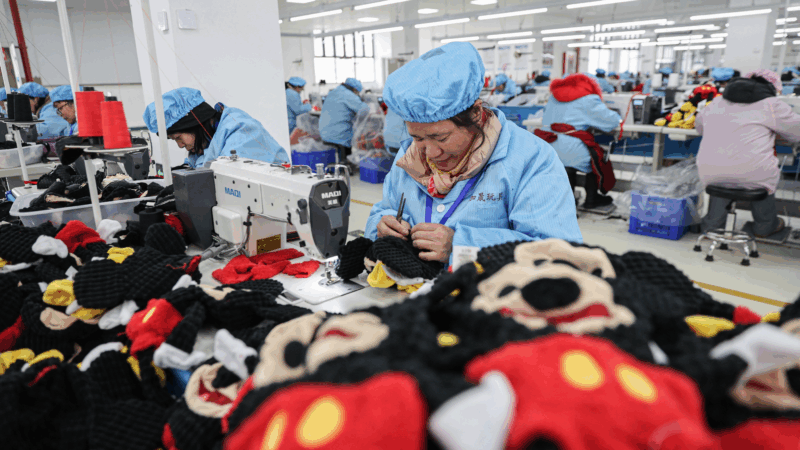China reports 5.4% GDP growth in 1st quarter, but analysts say tariffs will bite soon
GUANGZHOU, China — Economic activity in China surged in the first quarter of the year, beating expectations ahead of steep new tariffs telegraphed by the Trump administration.
Gross domestic product grew 5.4% in the period from January to March, compared to the same period last year, official data showed. A Reuters poll had growth expected at 5.1%.
The growth in the first three months was driven in part by strong industrial activity and exports. The government said policies to stimulate domestic demand also helped boost growth.
The Trump administration imposed new tariffs on Chinese imports of 20% during that period. President Trump also talked up his upcoming “reciprocal tariffs,” which were unveiled in early April.
U.S.-China tit-for-tat affects China’s economic growth
China was hit hardest by President Trump’s latest tariffs. The country is now subject to up to 245% of levies — though many key electronic goods from China have been exempted for now.
Beijing said last week that Trump’s tariffs are a “joke” and has kept its levies on U.S. goods at 125%. It has also cut off more rare earth minerals to the U.S. These metals are critical for defense technologies, medical treatments and consumer electronics.
Though Beijing has so far been defiant in its response to U.S. tariffs, analysts expect growth in China to slow in the current quarter because of the tariffs.
“Though we expect Beijing to significantly step up its efforts to replace the loss of exports to the US with domestic demand, this will likely be quite challenging,” Ting Lu, an analyst at Nomura, wrote in a research note. “China’s economy faces two material drags simultaneously: the ongoing property fallout internally and the unprecedented U.S.-China trade war externally.”
He added that the rapidly worsening U.S.-China trade war “might also deal a further blow to the still-struggling property sector, including property markets in tier-one cities, which have been showing some signs of stabilization.”
On Monday, UBS downgraded China’s 2025 growth forecast to 3.4%, assuming current tariff hikes remain and China rolls out additional stimulus, noting high margins of error due to uncertainty surrounding the tariffs.
“While China’s retaliatory tariffs may push up prices of some imports, the U.S. tariffs would reduce China’s external demand sharply and add downward pressures to domestic prices in China,” UBS wrote in a research note.
Amid the heightening trade war, China has filed a number of complaints to the World Trade Organization. On Wednesday, it appointed Li Chenggang, a former assistant commerce minister and China’s WTO ambassador, as its new trade envoy.
New York Giants hire John Harbaugh as coach after identifying him as their top choice
Harbaugh joins the Giants 11 days after he was fired by the Baltimore Ravens. The Super Bowl champion is now tasked with turning around a beleaguered franchise.
US launches new retaliatory strike in Syria, killing leader tied to deadly Islamic State ambush
A third round of retaliatory strikes by the U.S. in Syria has resulted in the death of an Al-Qaeda-affiliated leader, said U.S. Central Command.
NASA rolls out Artemis II craft ahead of crewed lunar orbit
Mission Artemis plans to send Americans to the moon for the first time since the Nixon administration.
Trump says 8 EU countries to be charged 10% tariff for opposing US control of Greenland
In a post on social media, Trump said a 10% tariff will take effect on Feb. 1, and will climb to 25% on June 1 if a deal is not in place for the United States to purchase Greenland.
‘Not for sale’: massive protest in Copenhagen against Trump’s desire to acquire Greenland
Thousands of people rallied in Copenhagen to push back on President Trump's rhetoric that the U.S. should acquire Greenland.
Uganda’s longtime leader declared winner in disputed vote
Museveni claims victory in Uganda's contested election as opposition leader Bobi Wine goes into hiding amid chaos, violence and accusations of fraud.






